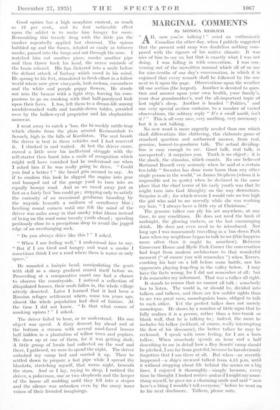MARGINAL COMMENTS
By MONICA RBOLICH cc
A H, now, you're talking I " cried an enthusiastic ..nk_ Canadian the other day, when I politely suggested that the present cold snap was doubtless nothing com- pared with the rigours of his native climate. It was .nice of him to say so, but that is exactly what I was not doing. I was falling in with convention. I was con- versing out of the unwritten manual which all of us use for nine-tenths of our day's conversation, in which it is enjoined that every remark shall be followed by the one next to it upon the page. Observations upon the weather fill one section (the largest). Another is devoted to ques- tion and answer upon your own health, your family's, your dear grandmother's, and the all-important topic of last night's sleep. Another is headed " Politics," and one very special section contains, to a number of varied observations, the solitary reply " It's a Small world, isn't it ! " This is all very nice, very soothing, very necessary : but • it is not talking.
No new word is More urgently needed than one which shall differentiate this chittering, this elaborate game of standard question and authorised answer, from real, genuine, honest-to-goodness talk. The, actual dividing- line is easy enough to see. Good talk, real. talk, is unexpected : it surprises you. Truth is no object : it is the shock, the stimulus, which counts. No one believed Bertrand Russell very seriously when he said at a certain tea-table "Socrates has done more harm than any other single person in the world," or James Stephens (whom it is impossible not to quote) when he declared in the same .place that the chief terror of his early youth was that he might turn into God Almighty on the way downstairs. Surprise is all ; -for whiekreason I would rate no less high the girl who said to me recently while she was . washing my hair, " I always have a little cry at Christmas." - The genuine talker can ply his art anywhere, at any time, in any conditions. He does not need the hush of midnight, the glowing embers, or the last encouraging drink. He does not even need to be introduced. Not long ago I was innocuously travelling in a 'bus down Park Lane when my neighbour began to talk to me (this happens more often than it ought to, somehow). Between Grosvenor House and Hyde Park Corner the conversation had leapt from modern architecture to that wonderful moment (" of course you will remember ") when Xerxes, combing his hair on a hill before some battle, saw his opponents playing leap-frog in the valley below. I may have the facts wrong, for I did not remember at.all : but I do remember my informant. That was a talker all right.
It stands to reason that we cannot all talk : somebody has to listen. The world is, or should be, divided into talkers and talkees, and there are few sadder sights than to see two great men, monologuists born, obliged to talk to each other. Yet the perfect talker does not merely monologue. He shows by a number of little signs that he fully realises it is a person, rather than a tree-trunk or blank Wall, that he is talking to ; indeed, the more he includes his talkee (without, of course, really interrupting the flow of his discourse), the better talker he may be reckoned. I speak with some feeling, for I am a born talkee. When somebody spends an hour and a half describing to me in detail how a Boy Scouts' camp should be pitched, I am •far from grateful, because he has obviously *forgotten that I am there at all. But when—as recently happened—a ship's steward talked from 4.15 p.m. until 8 Without stopping about life behind the scenes on a big liner, I enjoyed it thoroughly—simply because, every time he thought. I looked restive and as if I might say some- thing myself, he gave me a charming smile and said" now here's a thing I wouldn't tell everyone," before he went on to his next disclosure, Talkers, please note.•


































 Previous page
Previous page